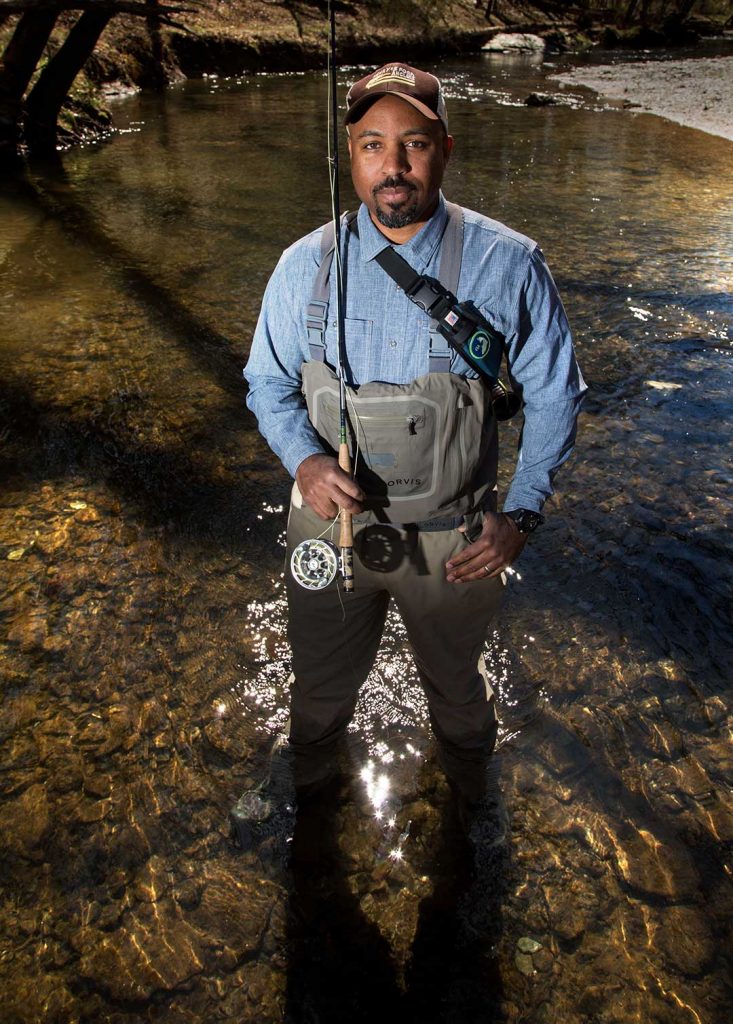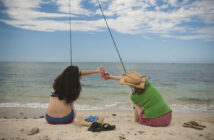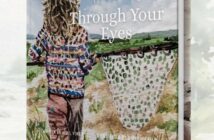
Joel Johnson Photo Credit: Laurence Kesterson
By Joel R. Johnson for Angling Trade Media
Besides the passage of the Great American Outdoors Act and COVID-19 cancellations, the biggest news in fishing this summer might be that in July The Orvis Company signed onto a pledge launched by Brown Folks Fishing, a grassroots organization committed to building community and expanding access among Black, Indigenous, and People of Color (BIPOC) in fishing and its industry. The Angling for All Pledge (created in the spirit and solidarity with the Outdoor CEO pledge devised by Teresa Baker) establishes a commitment to equity and inclusion in the angling community. The Orvis Company is the inaugural pledgee.
Popular fishing blog Flylords and many other fishing outlets carried the news. I was invited to comment on the news on Flylords’ Facebook page by an ally. Perusing the comments, I saw cancel culture at its worst with many folks saying goodbye to Flylords for even posting the news. Reactions ranged from, “I go fishing to get away from this” to “I hope this is a joke, I’ve never seen racism in fly fishing.”
There were the usual “I’m not racist” comments–which, in short, really means, “I believe in white privilege and so I’d rather not talk about racism or take the moment to acknowledge my fellow anglers experiencing racism.” Basically, “it’s all about me, my fishing, and my blissful ignorance.”
Some reactions on the Flylords thread did applaud Orvis’ move: “I’m so sick of this blah blah blah/stick to fishing/I go fishing to ignore racism. It’s called systematic racism look it up. Thank you Flylords for posting this.”
While the negative and cancel comments can be tiresome, it occurred to me that most commentators probably hadn’t read the article, and there are many anglers who hold the same sentiment off the water, and who certainly don’t actually know what systemic racism is or how it works, how it could possibly exist in fishing, and why The Orvis Company would want to work with Brown Folks Fishing on the issue.
So, systemic racism… what is it? First, it exists in every institution, including professional sports and casual outdoor activities like fishing, regardless of how integrated or diverse the sport is. Why? It’s how systemic racism works… systemic racism is an embedded system of discrimination where racist effects like exclusion and denigration based on skin color or ethnicity takes place even when there are no racists present. It works whether you’re looking or not.
Let’s look at swimming. A majority of African Americans don’t know how to swim compared to Whites (60% compared to 40%) and yet a black child between age 5 and 19 is nearly 6 times more likely to drown than a white child according to CDC data. That’s systemic racism at work. It is the curse of Jim Crow segregation of swimming pools still having an impact 40 years later.
The banks of some lakes and rivers may look like rainbows, may be a pastiche of languages, and full of nice guys and gals who “just want to go fishing”… but that doesn’t stop systemic racism. It is embedded in the cost of fishing licenses and gear, boating and access. It is embedded in the location of “blue ribbon” waters, and the idea of a “trophy.” It is embedded in “catch and release.” It is embedded in the internalized fear of fishing alone while being a person of color. It is rooted in the history of segregated public spaces and the outdoors.
Like Project Healing Waters or Casting for Recovery, Brown Folks Fishing is an affinity group with a purpose. It’s pretty ignorant to suggest folks with cancer or PTSD can’t come together to fish, commune and heal, and it’s ignorant and racist to say people of color shouldn’t do the same.
Overt individual acts of racist aggression take place off the water; why should it be different on the water? Here’s what happened to a friend last year while fly fishing solo in Colorado.
Imagine standing in the river minding your own business…you just tied on a green drake, because they’re popping…the excitement is palpable and your hands are shaking. Then a car rolls by you. You hear the words, “Nigger! Go home!”
Imagine the terror that hits you, sending a chill down your spine. You recover and think, EFF that guy, but… am I safe here? People who yell such racist insults are the same willing to escalate from words to gunshots.
B.S. you say, that’s just some random jerk and you should ignore it. Aggression happens.
Okay, now let me share with you something: I’ve been shot at on the river (not on the Pan thank God because I could never fathom not returning to that magical river and my friend was not accosted on the Pan, he has not shared the location).
I was fishing solo, but not alone, as the stretch of this river was popular with fly anglers. The day was bright, warm, and hazy. The water was low and clear. The wild browns were rising in front of me. I stopped wading to switch to a smaller sulphur fly for the slurping brown. There was a high trail on river-left and I could also hear people padding by occasionally.
The first bullet was just a whirring zip and splash. I thought it was an insect. I didn’t even hear the shot, so intent on the little brown as I was. The second was an unmistakable crack and splash in the water next to me.
I heard the laughter in the trees. The running footsteps. I heard the guys take a last potshot at a sign. I stared. I just stared. Was this really happening?
In the days and months afterward I struggled to downplay it. As one of the comments on Flylords put it, who wants to be “making something out of nothing?” At the time, I told myself it was a BB gun and kids playing around. I told myself they didn’t intend me any real harm. But I’ve come to accept it was intentional (there were other anglers, I was the only Black angler on the river), and that I could have been seriously hurt or worse.
I don’t expect the white anglers learning about Brown Folks Fishing and the courageous act of The Orvis Company becoming the first co-signer to this Pledge to agree with anything I’ve just shared, because that’s precisely the point of systemic racism. It continues to work when no one thinks it does (kinda like the Devil). And when it’s not systemic, it’s just plain old everyday violence. You may not believe in the Devil, but racism believes in you.
I know that anglers are a pretty special sort of people. We have the amazing talent to “pattern” fish and read the water. If we pattern this situation and the voices being raised about this issue, we should be able to say, hey, something is happening and maybe I ought to add some weight or change my fly. Maybe I ought to go deeper. I ought to hear these voices, like I read the river, consider what they’re saying, and be willing to adapt.
So what will The Orvis Company do and how will it make a difference? They’ll train in an equity and inclusion curriculum and get wiser about how to bring it into their business thinking. As leaders in fishing, it’ll set a path for greater representation and equality in our sport.
To learn more about the issue of equity and inclusion in outdoor recreation, and how to be an ally of groups like Brown Folks Fishing and other related organizations, here are some resources.
Organizations
Outdoor CEO Pledge (In Solidarity Project)
Thrive Outside Community Initiative (Outdoor Industry Foundation)
Reading
The Adventure Gap, Changing the Face of the Outdoors by James Edward Mills
Thoughts on the Killing of George Floyd by Chad Brown of Soul River Outfitters
Videos
Racism is Real! By Alvin Dedeaux, Guide
Tom Rosenbauer and Joel Johnson Discuss Diversity in Fly Fishing




13 Comments
Thanks for this, Joel. Sobering, alarming … and enlightening.
Wonderful piece to read and a damn good description of systemic racism – racism exists even when no racists are around.
Yes thanks for sharing this. Chilling stories and sorry you had those experiences. I often fish alone. Even before reading this I thought if I was a person of color would I feel safe fishing alone? Like not.
I do agree with the author that anglers who are people of color should not be shot at, endure racial slurs, or be denied access to fishing because of their race. I also agree that Brown Folks Fishing has a legitimate right to exist. However, I don’t agree with this:
… but that doesn’t stop systemic racism. It is embedded in the cost of fishing licenses and gear, boating and access. It is embedded in the location of “blue ribbon” waters, and the idea of a “trophy.” It is embedded in “catch and release.”
Resident fishing licenses are not expensive. If someone can’t afford a fishing license and an inexpensive rod and reel combo, they have big financial problems. Boats can be expensive, but you don’t need a boat to fish. I prefer to not fish from a boat, and a boat is entirely not necessary for stream trout fishing and surf fishing for anything. Bait is free if you catch your own. “Blue Ribbon” waters are where they are. Catch and Release is a valid management tool, but it should not be used as a cudgel to beat catch and eat anglers into submission.
I think implying that people of color can’t afford fishing licenses and gear is an insult to people of color who can afford those things. Furthermore, there are people of all colors, including white, that cannot afford expensive fishing gear and boats.
I know a black man who has been fly fishing for 40 years, practices catch and release, and owns a center console boat. His favorite sport is sight fishing with flies for tarpon. Is he a sellout to white culture?
Am I racist if I prefer to catch “trophy” sized fish? If so, how? Maybe I’m a racist because I prefer to catch smallmouth bass instead of largemouth bass. Or does that make me a speciesist?
I largely agree.
The author of the article makes many claims of systemic racism but he shows no supporting examples nor explanations of his claims.
The personal examples of racist individuals he describes are shocking, abhorrent, and indefensible. I hope that I don’t fish with anyone who would even consider doing such things.
I wish the author well, but I came to read his article with the idea that there would be an problem identified, reasonable information given that would support that claim of a problem, and then a discussion of solutions.
Sadly, there was none of that.
Bravo Joel for writing this. Kudos to Orvis stepping up. Kudos for Angling Trade for running this.
Really well done and illuminating. Thank you so much for posting Eric.
I came here honestly expecting to learn something, but what I found are continuous claims of systemic racism in fishing with no examples to support those claims.
“that doesn’t stop systemic racism. It is embedded in the cost of fishing licenses and gear, boating and access”
There are many more, millions more, poor whites in in the US than poor blacks, so there are many more whites affected by cost vs blacks. Now, he could make the argument that cost is discriminatory to poor people, regardless of race.
“It is embedded in the location of “blue ribbon” waters, and the idea of a “trophy.””
I assume, since he does not explain, that he means cost of getting to “blue ribbon” waters, which, apparently, he thinks are the are the only places to get a “trophy” fish? If so, this is another aspect that is discriminatory to any and all non-local poor people, of whom, again, the majority are white.
Really? Courtesy toward other fisherpeople by paying it forward by choosing to let the fish you caught live so someone else can then also have the enjoyment of catching it is embedded systemic racism?
“It is embedded in the internalized fear of fishing alone while being a person of color.”
Yeah, I get that, based on his two examples of threats and violence. F*** those dudes in his examples and anyone else who would think or do such things. Cowards.
“It is rooted in the history of segregated public spaces and the outdoors.”
I really don’t know what to make of that. It’s been 60 years. Regardless of segregation, people of all colors have happily sat on the banks of their local creeks and ponds all across the US waiting for that tug since, well, fishing was invented. I can understand, though, that there might be some older black people who could still feel uncomfortable in certain places because of their experience with segregation. Is that what’s he’s talking about?
Sorry, I can’t edit my comment. The “Really? Courtesy toward other fisherpeople…” sentence should be preceded by:
“It is embedded in “catch and release.”
Sorry to hear of your bad experiences Joel. Thank you for the article. I think it’s laudable that you’ve put yourself in the position of explaining the effects of racism to people who have had no experience of it. To be blunt, I am talking about white people in the West. I think there are degrees of resistance to these explanations for the reasons that you’ve outlined. People don’t want to let go of an image that they’ve cherished, of a rainbow-nation sport where everyone leaves their prejudices at home. It’s difficult for me, as a British Middle-Eastern African male, to imagine myself into that kind of state of mind; everything being always harmonious by the seashore. Racism in angling in England takes various forms and they are all quite predictable to anyone from a minority background. So looking as I do, I am exempted from the common targets of English fishing racism. Or maybe not that enough people have really got in my face about it for me to remember. The groups that the racists here like to make up stories about are anglers of Chinese appearance, and anglers from Eastern Europe. Interestingly, there’s a saltwater/freshwater split. If you look like your parents are from the far-East, here, and you are fishing in the sea, expect trouble from idiots who will accuse you of taking massive amounts of undersized fish. Maybe this gets mixed up in foolish people’s minds with the current right-wing hysteria about illegal immigration onto the southern coast of the U.K, by small boats of refugees coming from France. There’s certainly a cultural assumption and a protectiveness of ‘English’ culture’ bound up in anti-Eastern European prejudice from racist English fresh-water anglers. I feel that it is racism rather than prejudice as the victims are seen as an undifferentiated homogenous group, rather than identifying nationalities within Eastern Europe. A pretext again, is the fiction of the wrong fish being taken for the table. Here it’s a big no-no to kill and eat what are called ‘coarse fishing’ freshwater species. These are carp, pike, perch, bream, roach and so on. Again, racists online and in reality, on the river bank, like to tell tales of Polish anglers taking away all the coarse fish, and how the fishing has really declined since Eastern European anglers started fishing a particular spot. As with a lot of subtle racism, the accusations are based on a half-truth; carp is a traditional Polish dish. I’ve also heard of at least one black British coarse-fishing angler attempting to get into the competition scene(which can be lucrative) and being excluded due to that being traditionally a white working-class activity. I was treated with a bizarre amount of suspicion a couple of years ago, by a white angler, on the bank of a canal in inner London. This gentleman had caught a fine carp, which I admired. He instantly warned me that it was ‘not for eating’. I replied on the lines of ‘of course not’. His next worry, apparently, was that I was ‘Old Bill’; a cop. So all Arabs in London are , in this guy’s head, either going to eat his fish, or are undercover police stalking him. Strange man. So all in all, yup, overt and institutional racism exists in fishing. People may start screaming and throwing their toys out of the pram when this is pointed out to them, that doesn’t make it any less true.
I understand that the Bravo Joel for writing this. Kudos for Angling Trade for running this.
Joel, the treatment you’ve endured — those traumatizing experiences of racism and hate — hasn’t hardened your heart or turned you away from others, from the sport, or from your love of the outdoors, and that’s remarkable, inspiring. Sometimes fishing is just fishing. Sometimes it’s an act of courage, a statement of moral values. I hope your testimony inspires others.
The racist mass shooting in Buffalo over the weekend — just like we’ve seen before in South Carolina and Oak Creek — reminds us that state- and non-state persecution of black, brown, indigenous, and other people of color is very much active and alive. It isn’t one man’s theory; it’s millions of Americans’ daily experience.
For those commenting that trophy waters, catch-and-release, the costs of gear and licensing aren’t examples of systemic bias, embedded racism, or mechanisms of exclusion — just because there are poor white people doesn’t mean people of color aren’t specifically targeted by these policies and constructs. Just like “Black Lives Matter” doesn’t imply that other lives *don’t* matter, it’s astounding to me how quickly white people jump to undermine and object to racial equity and justice realities. What exactly are you all afraid of?
Why aren’t you able to sit with the reality of this without acting immediately to deny, dismiss, and denigrate it? Be better. Do better.
And bravo, Joel. Thank you for illuminating the road ahead.
I totally disagree with the claim of systemic racism and especially in fishing. People do what they have interest in and what a parent exposes them to. I don’t cry racism in the NBA or NFL and it’s a cancerous trend to attack everything with this claim. I have never gone fishing and thinking about how can the system make it harder for some race to do the same thing and I have been fishing with people of different races in the common thread as they just enjoy doing it and they grow up doing it. If you can’t give hard evidence of a planned, purposeful attempt to stop certain races from Fishin then shut your mouth . So I don’t see a lot of Black people flyfishing I don’t see a anything evil in that I don’t see racism in it it’s just that people prefer to do different things or they’re exposed to different things or not at the young age. So I think it’s a crock so now you see all black models in Orvis is that a percentage representation of how many Black people fly fish or of their Customer base no. Personally, I think all this is racism itself.